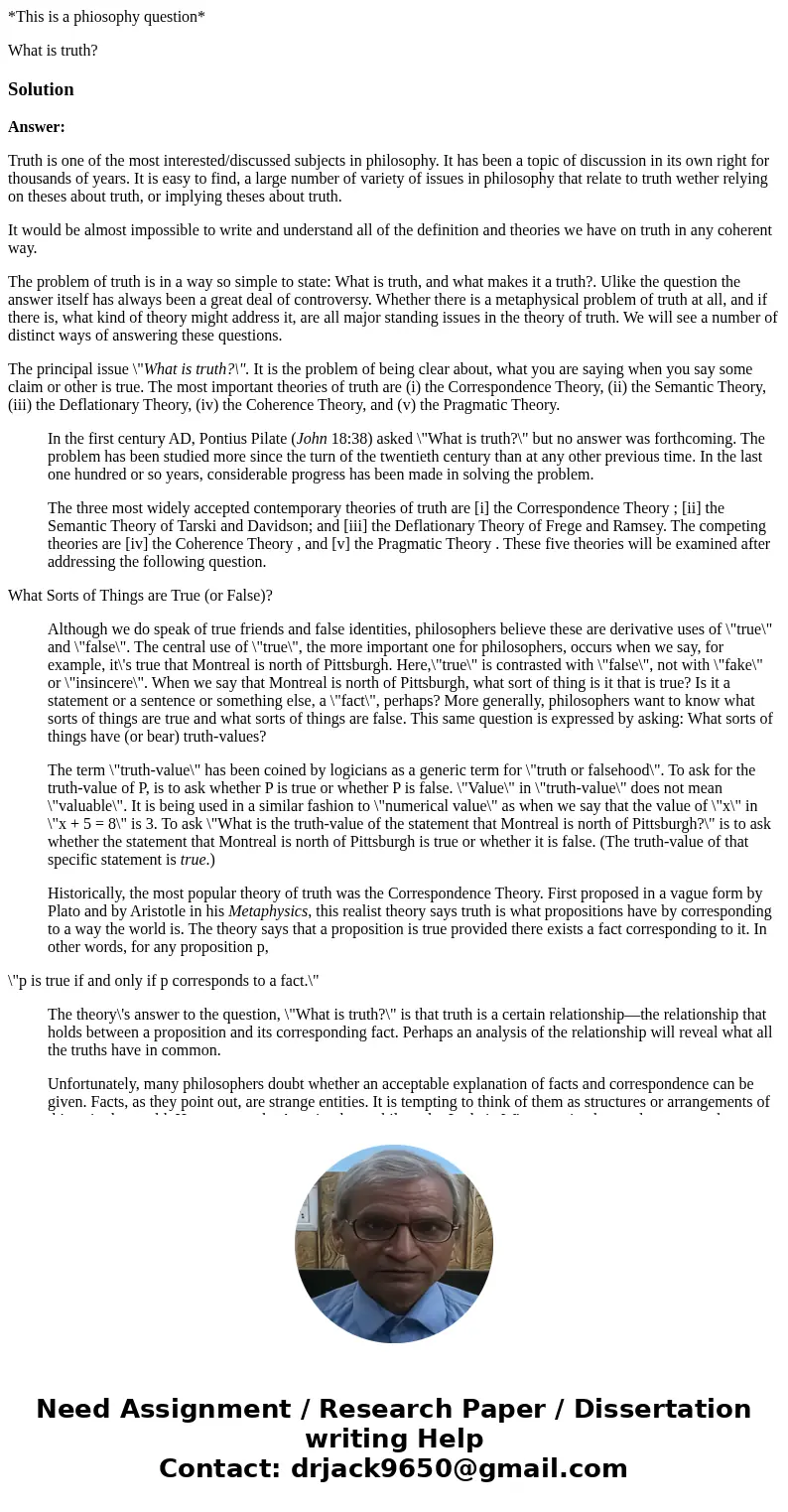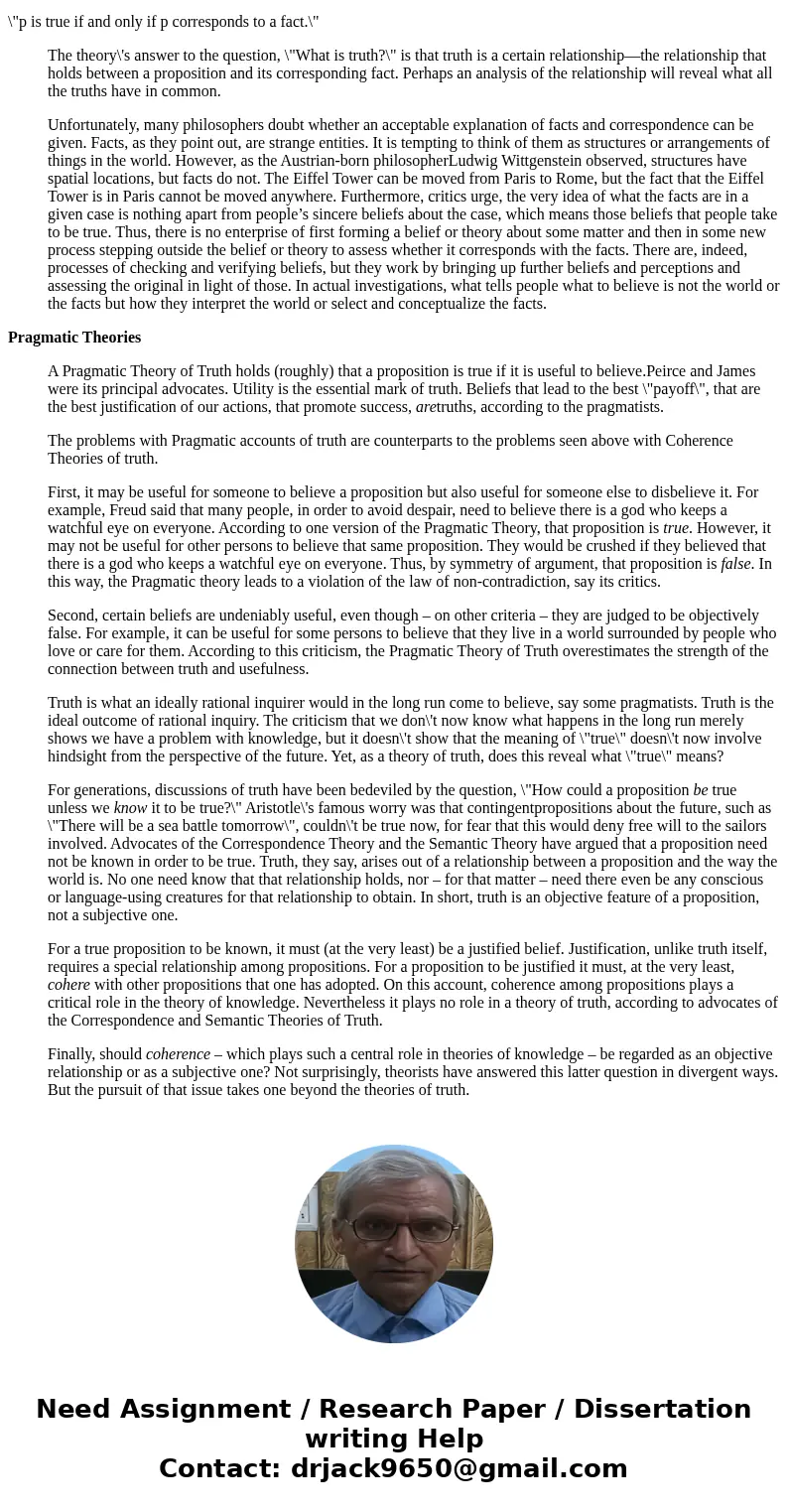This is a phiosophy question What is truthSolutionAnswer Tru
*This is a phiosophy question*
What is truth?
Solution
Answer:
Truth is one of the most interested/discussed subjects in philosophy. It has been a topic of discussion in its own right for thousands of years. It is easy to find, a large number of variety of issues in philosophy that relate to truth wether relying on theses about truth, or implying theses about truth.
It would be almost impossible to write and understand all of the definition and theories we have on truth in any coherent way.
The problem of truth is in a way so simple to state: What is truth, and what makes it a truth?. Ulike the question the answer itself has always been a great deal of controversy. Whether there is a metaphysical problem of truth at all, and if there is, what kind of theory might address it, are all major standing issues in the theory of truth. We will see a number of distinct ways of answering these questions.
The principal issue \"What is truth?\". It is the problem of being clear about, what you are saying when you say some claim or other is true. The most important theories of truth are (i) the Correspondence Theory, (ii) the Semantic Theory, (iii) the Deflationary Theory, (iv) the Coherence Theory, and (v) the Pragmatic Theory.
In the first century AD, Pontius Pilate (John 18:38) asked \"What is truth?\" but no answer was forthcoming. The problem has been studied more since the turn of the twentieth century than at any other previous time. In the last one hundred or so years, considerable progress has been made in solving the problem.
The three most widely accepted contemporary theories of truth are [i] the Correspondence Theory ; [ii] the Semantic Theory of Tarski and Davidson; and [iii] the Deflationary Theory of Frege and Ramsey. The competing theories are [iv] the Coherence Theory , and [v] the Pragmatic Theory . These five theories will be examined after addressing the following question.
What Sorts of Things are True (or False)?
Although we do speak of true friends and false identities, philosophers believe these are derivative uses of \"true\" and \"false\". The central use of \"true\", the more important one for philosophers, occurs when we say, for example, it\'s true that Montreal is north of Pittsburgh. Here,\"true\" is contrasted with \"false\", not with \"fake\" or \"insincere\". When we say that Montreal is north of Pittsburgh, what sort of thing is it that is true? Is it a statement or a sentence or something else, a \"fact\", perhaps? More generally, philosophers want to know what sorts of things are true and what sorts of things are false. This same question is expressed by asking: What sorts of things have (or bear) truth-values?
The term \"truth-value\" has been coined by logicians as a generic term for \"truth or falsehood\". To ask for the truth-value of P, is to ask whether P is true or whether P is false. \"Value\" in \"truth-value\" does not mean \"valuable\". It is being used in a similar fashion to \"numerical value\" as when we say that the value of \"x\" in \"x + 5 = 8\" is 3. To ask \"What is the truth-value of the statement that Montreal is north of Pittsburgh?\" is to ask whether the statement that Montreal is north of Pittsburgh is true or whether it is false. (The truth-value of that specific statement is true.)
Historically, the most popular theory of truth was the Correspondence Theory. First proposed in a vague form by Plato and by Aristotle in his Metaphysics, this realist theory says truth is what propositions have by corresponding to a way the world is. The theory says that a proposition is true provided there exists a fact corresponding to it. In other words, for any proposition p,
\"p is true if and only if p corresponds to a fact.\"
The theory\'s answer to the question, \"What is truth?\" is that truth is a certain relationship—the relationship that holds between a proposition and its corresponding fact. Perhaps an analysis of the relationship will reveal what all the truths have in common.
Unfortunately, many philosophers doubt whether an acceptable explanation of facts and correspondence can be given. Facts, as they point out, are strange entities. It is tempting to think of them as structures or arrangements of things in the world. However, as the Austrian-born philosopherLudwig Wittgenstein observed, structures have spatial locations, but facts do not. The Eiffel Tower can be moved from Paris to Rome, but the fact that the Eiffel Tower is in Paris cannot be moved anywhere. Furthermore, critics urge, the very idea of what the facts are in a given case is nothing apart from people’s sincere beliefs about the case, which means those beliefs that people take to be true. Thus, there is no enterprise of first forming a belief or theory about some matter and then in some new process stepping outside the belief or theory to assess whether it corresponds with the facts. There are, indeed, processes of checking and verifying beliefs, but they work by bringing up further beliefs and perceptions and assessing the original in light of those. In actual investigations, what tells people what to believe is not the world or the facts but how they interpret the world or select and conceptualize the facts.
Pragmatic Theories
A Pragmatic Theory of Truth holds (roughly) that a proposition is true if it is useful to believe.Peirce and James were its principal advocates. Utility is the essential mark of truth. Beliefs that lead to the best \"payoff\", that are the best justification of our actions, that promote success, aretruths, according to the pragmatists.
The problems with Pragmatic accounts of truth are counterparts to the problems seen above with Coherence Theories of truth.
First, it may be useful for someone to believe a proposition but also useful for someone else to disbelieve it. For example, Freud said that many people, in order to avoid despair, need to believe there is a god who keeps a watchful eye on everyone. According to one version of the Pragmatic Theory, that proposition is true. However, it may not be useful for other persons to believe that same proposition. They would be crushed if they believed that there is a god who keeps a watchful eye on everyone. Thus, by symmetry of argument, that proposition is false. In this way, the Pragmatic theory leads to a violation of the law of non-contradiction, say its critics.
Second, certain beliefs are undeniably useful, even though – on other criteria – they are judged to be objectively false. For example, it can be useful for some persons to believe that they live in a world surrounded by people who love or care for them. According to this criticism, the Pragmatic Theory of Truth overestimates the strength of the connection between truth and usefulness.
Truth is what an ideally rational inquirer would in the long run come to believe, say some pragmatists. Truth is the ideal outcome of rational inquiry. The criticism that we don\'t now know what happens in the long run merely shows we have a problem with knowledge, but it doesn\'t show that the meaning of \"true\" doesn\'t now involve hindsight from the perspective of the future. Yet, as a theory of truth, does this reveal what \"true\" means?
For generations, discussions of truth have been bedeviled by the question, \"How could a proposition be true unless we know it to be true?\" Aristotle\'s famous worry was that contingentpropositions about the future, such as \"There will be a sea battle tomorrow\", couldn\'t be true now, for fear that this would deny free will to the sailors involved. Advocates of the Correspondence Theory and the Semantic Theory have argued that a proposition need not be known in order to be true. Truth, they say, arises out of a relationship between a proposition and the way the world is. No one need know that that relationship holds, nor – for that matter – need there even be any conscious or language-using creatures for that relationship to obtain. In short, truth is an objective feature of a proposition, not a subjective one.
For a true proposition to be known, it must (at the very least) be a justified belief. Justification, unlike truth itself, requires a special relationship among propositions. For a proposition to be justified it must, at the very least, cohere with other propositions that one has adopted. On this account, coherence among propositions plays a critical role in the theory of knowledge. Nevertheless it plays no role in a theory of truth, according to advocates of the Correspondence and Semantic Theories of Truth.
Finally, should coherence – which plays such a central role in theories of knowledge – be regarded as an objective relationship or as a subjective one? Not surprisingly, theorists have answered this latter question in divergent ways. But the pursuit of that issue takes one beyond the theories of truth.


 Homework Sourse
Homework Sourse